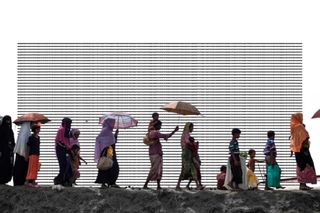
Why We Need To Stop Calling People ‘Illegal Immigrants’
The phrase, currently in use to describe Rohingya refugees, dehumanizes people fleeing violence and frames them as a security threat.

This week, a 14-year-old Rohingya girl, detained for two years in India, faced a peculiar situation: authorities wanted to deport her back to Myanmar, but her family was in Bangladesh’s refugee camps. She drew public attention for being the first person India officially attempted to deported since a military coup began in Myanmar; a minor forced to flee violence was sent back to even more violence, critics decried. The deportation didn’t take place in the end, because Myanmar authorities refused to accept her, The Wire reported Friday. But it is the government’s firm stance that stands out: the girl, along with more than 150 immigrant Rohingyas who escaped persecution in Myanmar and were living in Jammu and other states, was ‘illegal’ and must exit Indian premises, they maintained.
The persistent labeling of people as illegal immigrants is a poignant issue, one that has perturbed western countries like the U.S. for long. Perhaps, the human rights crisis unfolding right under our eyes gives India sufficient reason to mull over the moral concerns at play in the language we use to discuss them.
The most evident is the way this dubious attribution frames vulnerable people seeking a better life. “The use of the term ‘illegal’ to refer to a person is a usage which is confined to exactly one group of people: Migrants. As a result, ‘illegal,’ when used as a noun, always means immigrants—people whose only crime is the victimless pursuit of liberty and prosperity,” Felix Salmon wrote about what we understand when we hear the word ‘illegal’ in Fusion. Human rights groups have called ‘illegal immigrant’ a “slur” and “pejorative” as well; arguably, it strips people of the dignity and humanity to which they, like everyone, are entitled to.
The language of immigration, or any socio-cultural issue, is more than minor semantic hiccups; it is inherently political. In calling people illegal, there is an implication that someone poses a security threat; several political parties and organizations in Jammu have claimed Rohingyas presence is a “threat to peace” and a “conspiracy to alter the demographic character,” The Print reported. During a hearing in the Supreme Court last week, the Centre called Rohingyas “absolutely illegal migrants” who posed “serious threats to the national security.” The counsel pushing for their deportation told the bench it would start “a dangerous trend” by interfering with a diplomatic issue relating to “illegal migrants.”
Rohingyas, in particular, are doubly oppressed; as a Bengali-dialect speaking Muslim minority from Myanmar, they also bear the stigma of being Muslims in a country witnessing growing religious friction. India’s most recent policy around displaced people from neighboring countries (the Citizenship Amendment Act) still weighs fresh in public discourse; many have argued that Islamophobic sentiments underline the contentious national policy. The term ‘illegal,’ used more and more by the state, only works to alienate them.
American media houses have recalibrated their style guide over the years; the Associated Press, NBC, and ABC have banned “illegal immigrant”; they recommend the usage of “undocumented” instead, reiterating the idea that even language can be violent.
Related on The Swaddle:
J&K Government Rounds Up 168 Rohingya Refugees, Places Them in Holding Centres
Beyond linguistics, the term alters, and ignores, a grim social reality. The Rohingyas fled to parts of India and Bangladesh not out of whim: as a persecuted ethnic minority in Myanmar, they have been facing an ongoing genocide since 2017. The United Nations has called the Myanmar army’s campaign against the Rohingya “a textbook example of ethnic cleansing.” Rohingyas’ displacement is as much a state issue as it is a humanitarian one; but by casting their presence in refuge countries as illegal, the discourse stops being about the people and their persecution, and instead transforms them into perpetrators of harm against the state.
Sabber, a Rohingya Myanmar who reached India in 2008, recounts the scale of violence to The Wire’s Ismat Ara: “We will be killed if we return … They were burning us to death back there. My family sent me because I was the only one who could manage such a long journey, my parents were old and my sister was weak.” His mother, father, and sister are still in Myanmar.
An article in The Swaddle last month also pointed out the pathos of the deportation exercise: “It is not clear where the Rohingya people would be deported. In Myanmar, they would likely face death following the recent coup by the military, a key institution driving the genocide of the community. Bangladesh, at the forefront of the Rohingya influx from Myanmar, has refused to accept forcible returns of the people and is undertaking its own questionable process of moving Rohingya people to Bhasan Char, a newly-formed sediment island in the Bay of Bengal. This may leave the Rohingya people in J&K, and potentially elsewhere in India, in permanent residence at the sub-jail, an incarcerated state that cannot be the solution to the crisis — even if it is mutually acceptable to the state.”
The debate around refugee rights and citizenship is not a new one. In 2017, India’s Ministry of Home Affairs issued an urgent notice to all states and union territories saying that Rohingya “illegal migrants” must be identified and deported without delay. While hearing the Rohingya deportation issue on March 26 this year, the Supreme Court remarked: “The fear is that once they are deported, they may get slaughtered. But we cannot stop it….” The Chief Justice also added that India cannot become the “international capital of illegal migrants,” according to a Hindustan Times report.
A commonly recognized principle under the international human rights framework asserts the idea of ‘non-refoulment,’ noting that people should not be returned to a country where they would face “torture, cruel, inhuman, or degrading treatment or punishment, and other irreparable harm” — which Rohingyas do. But since India is not a party to the 1951 Refugee Convention, the global treaty to protect the interests of refugees, India faces no legal qualms in carrying out the present deportation exercise.
The tussle between law and human rights could continue till the end of time. But in the end, it boils down to: can a person be illegal? “The word ‘illegal’ in itself is evil and fundamentally wrong … There can be irregular migrants or undocumented migrants, not illegal human beings,” Fazal Abdali, an associate with the Human Rights Law Network, reflects in The Wire.
Language carries the imperative of evolution; our linguistic understanding has progressed to find better substitutes for many objectionable terms: we have found wisdom in using “oppressed” instead of “lower” while talking about the Indian caste system; historians now prefer the usage of “enslaved persons” to “slaves.” More recently, people pointed out the erroneous labeling of migrant workers; they have been invisibilized, and aren’t invisible, as many media reports termed them. Perhaps, the phrase ‘illegal immigrant’ could come to a much-needed halt.
New York Times writer Jeffrey Toobin, in a 2015 article titled “Should I Use The Term ‘Illegal Immigrants’?”, argued that the term has proved to be slanderous and should retire from civilized discourse. His conclusion was this: “There does seem to be a consensus against the use of the term by the people most affected by it, who happen to be a vulnerable minority seeking a better life, and that’s good enough for me. Personally, I’m dropping the use of the term ‘illegal immigrant.'” This battle over words seems primed for a moral resolution.
Saumya Kalia is an Associate Editor at The Swaddle. Her journalism and writing explore issues of social justice, digital sub-cultures, media ecosystem, literature, and memory as they cut across socio-cultural periods. You can reach her at @Saumya_Kalia.
Related


“Trying to Break My Own Preconceived Notions” About LGBTQ+ Issues, Madras HC Judge Says
